
The Kirchenbuch Virtuell site houses more than three hundred years of church records from northern Bavaria.
You’ve already seen that some of the megasites (principally Ancestry.com <www.ancestry.com>, FamilySearch.org <www.familysearch.org>, and Archion <archion.de>) are the marquee sites for church records of our German-speaking ancestors, but you don’t have to stop there. These records—which the late John T. Humphrey called “the heart and soul of German genealogy”—can be found on an increasing number of websites. A number of these include records from German-speaking areas outside of today’s Germany, but I’ve included them here because many Americans have ancestors from these areas. Note that more religious archives—those that run their own websites—will be covered in chapter 12.
All of the following sites are written in German or French, so you will put your newfound translation skills from sites noted in chapter 3 to good use. Beware the English versions of each site; content may have been stripped out to avoid having to initially translate and constantly maintain multiple language versions of the site. View the site in its native language and attempt to use Google Translate <translate.google.com> or another translation service to keep much as of the original website as possible.
In many German states, religious minority groups were historically forced to register their births, marriages, and deaths within the registers of the established church of the particular state. Therefore, you may find records of Anabaptists (such as Mennonites) or Jews in Roman Catholic, Reformed, Lutheran, or Evangelisch records.
Bürgernetz Bayreuth e.V (Bayreuth Citizens’ Network Association) is a nonprofit organization in the Bavarian city of Bayreuth that supports a wide range of projects. One of those projects happens to be Kirchenbuch Virtuell (Virtual Church Book), which is an effort to digitize church books from towns and villages surrounding Bayreuth as well as the city itself <www.kirchenbuch-virtuell.de>. This site contains church records from the late 1500s through the 1900s from areas surrounding Bayreuth in northern Bayern (Bavaria). To see which villages are available before spending any money, click Aktuelles und Wichtiges from the navigation menu on the left side of the page, and scroll down.
To access the site, click Benutzerkonto erstellen (Create a user account) from the main page (image A.), then fill out the user registration form. When you’re finished, go back to the main page and click on the three links at the bottom of the page one at a time, and print out each page (image B.). Fill out the two registration forms (one is for membership in the church book club and one is to indicate which church books you would like to access). Mail the completed forms to the address listed at the bottom of the instructions page. Wire the amount required (forty-two euros, plus ten euros for each parish) to the account listed on the information page. Once the organization has received your completed registration forms as well as the required fees, you will receive a password that you can use to access the church books you would like to see.

The Kirchenbuch Virtuell site houses more than three hundred years of church records from northern Bavaria.
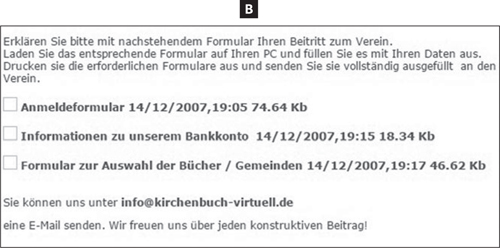
In order to use Kirchenbuch Virtuell, you’ll need to print out and submit forms found on the site.
Matricula is a free pilot project by an Austrian nonprofit organization called ICARUS that seeks to digitize, as its name implies (matricula is Latin for “register”), the vital records kept by the Catholic Church in the region. The project <www.icar-us.eu/cooperation/online-portals/matricula> has placed more than seven million pages of church books online so far, including Catholic records from the 1500s to the 1900s from the following diocese archives: St. Pölten, Oberösterreich (Upper Austria), and Wien (Vienna), covering the modern states of Upper Austria, Lower Austria, and Vienna in northern Austria; Passau (southeastern Bavaria near the border with Upper Austria) in Germany; and Breslau (now Wroclaw; southwestern Poland near the border with the Czech Republic) in Poland.
From the URL above, click Zum Archiv (To the Archive) to access the site’s records (image C.). The directory along the left side is organized first by country, then by diocese archive, first letter of the village, and finally village. When you find the village you’re looking for, click the + symbol next to its name. The details about that village will appear to the right. Click the link for Liste der Bände der Gemeinde (List of volumes of the parish) to view the village’s collection (image D.). Click the church book you are interested in. The detail for the church book displays. Click zum Buch (To the Book) to view the church book if you see a camera icon (image E.). The first image displays in a new window. Use the controls (most of them intuitive) along the bottom of the screen to go from page to page and zoom in and out.
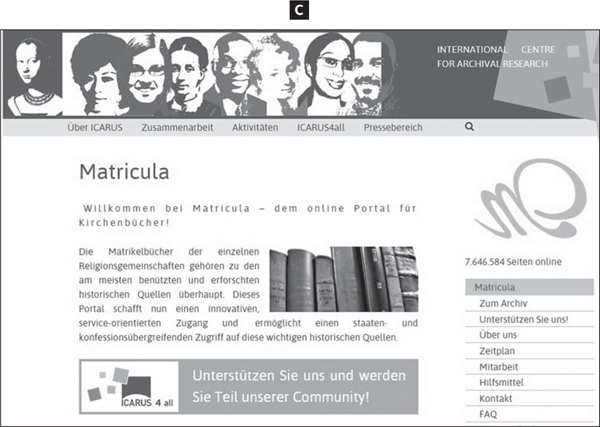
Matricula contains digitized Catholic records from churches in Austria, Germany, and even Poland.
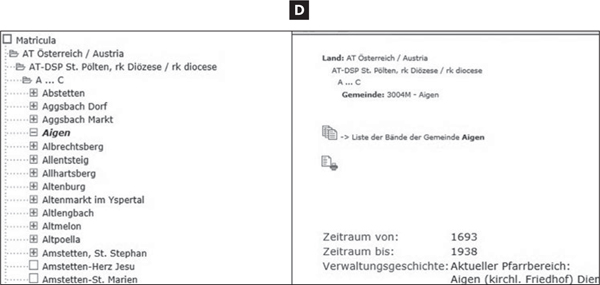
Matricula’s records are organized by country, then by diocese, first letter of the village name, and village name. Each village’s page displays what records are available for that village.

You can browse certain books page by page at Matricula.
The free Staatsarchiv Freiburg (Freiburg State Archive) <https://www2.landesarchiv-bw.de/ofs21/olf/struktur.php?bestand=10028> has digitized its holdings of church book duplicates that served as civil registration records in the Grand Duchy of Baden from 1810 through 1875. Freiburg is the archive for the southern part of the former Baden, and therefore its holdings concentrate on that area, reaching as far as Bühl to the north and the Swiss border to the south. In addition, the collection has Catholic, Evangelisch (Evangelical), and Jewish church and synagogue book duplicates from 1810 to 1875 in towns in the southern part of the former Grand Duchy of Baden (from Bühl in the north to the Swiss border in the south and from the French border in the west as far as Bonndorf in the east).
From the URL above, click Strukturansicht mit Suche a village name along the left side of the page. The list of available books from that village appears to the right. Click the Archivalieneinheit einsehen (Look at archive entry) link for the book you would like to view. Note that only twenty entries are displayed on each page, and most villages have multiple pages. Instead of having to page through, you can click Alle next to the page navigation buttons to display all entries for that village on one page (image F.). It may be easiest to click Bild 1 (Image 1), then move through the book page by page using the intuitive navigation controls along the top of the page. To make things even easier, many of the pages have been indexed by FamilySearch, and the indexed material appears above the image so that you don’t have to read the pastor’s handwriting (image G.).

The state archive in Freiburg has digitized its church book duplicates, sorted by village.
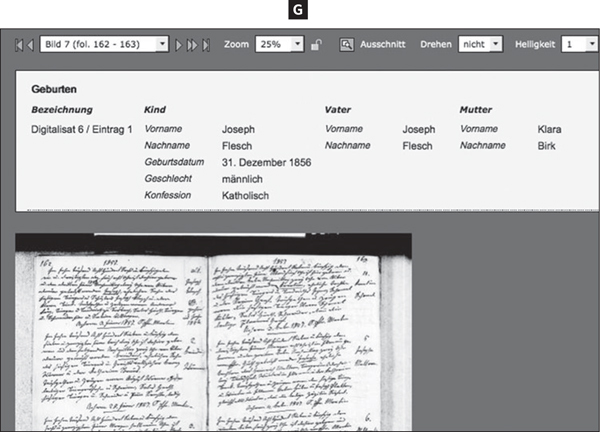
Many of the books available at the Staatsarchiv Freiburg have been indexed by FamilySearch, and these indexes appear next to the book’s scanned pages for reference.
At varying times over the last 150 years, Alsace was under the control of both the French (between the world wars) and the Germans (under the Second German Empire and during Hitler’s regime). France introduced civil registration in 1792, and the practice continued even when the area came under German control in the 1870s (which was around the time that civil registration was begun in most of the rest of the Second German Empire). Many of the town names in this region are German in etymology and have German-speaking people living there. The northern half of Alsace is now known as Bas-Rhin (Lower Rhine), and the archive there has done an excellent job of digitizing not only its civil registration holdings but its Catholic and Protestant church books as well <etat-civil.bas-rhin.fr/adeloch/index.php>. This free archive has Catholic and Protestant church records (1600s through late 1700s) as well as civil registration (1792 through early 1900s) records from Bas-Rhin.
From the site’s home page, click the check box labeled J’accepte ces conditions to accept the site’s terms and conditions (you should translate and read this), then click Accéder à la version graphique. When the screen pops up, start typing the name of the village you’re looking for, and you should quickly see the selection area narrowing down possible villages with those letters at the beginning. Click the village name that you are interested in (image H.). Find the point in time you’re looking for along the timeline at the bottom, then locate the correct book that contains the time frame you are interested in.

The archives of the Bas-Rhin has digitized civil and church records for the towns in its historical jurisdiction (such as Badenheim) and organized them by time period and type.
Note that if you see a translucent purple outline above the books, you are looking at church records; at the beginning of each purple outline, the system tells you what denomination and parish the group of books is for. If you don’t see a translucent purple outline at the top, you are looking at civil registration records. Click the book you want to look at twice. The record book is displayed. Navigate through the pages using the arrows and slider at the bottom, and control zoom and brightness using the buttons at the top right.
Like Du Bas-Rhin, the southern half of Alsace called Haut-Rhin (Upper Rhine) bounced back and forth between French and German control: French until the Second German Empire and between the world wars, and German during the Second German Empire and World War II. These free archives <www.archives.cg68.fr> contain civil registration records (1792 through early 1900s) from Haut-Rhin, which has been part of France since World War II but has a significant German population.
From the URL above, click the Services tab. Along the left navigation pane, click Actes d’état civil. On the search form (image I.), select the village you’re looking for in the Commune field. If you know the specific type of record you are looking for (indexes, births, marriages, deaths, etc.), you can select it in the Type d’acte field. And if you have a specific year you are looking for, you can enter it in the Recherche par année field. In the dropdown, you can select Egale à (Exactly), Inférieure à (Before), Supérieure à (After), or Entre (Between). Click the Rechercher button. The available civil registration books appear below the search form. Click the magnifying glass on the right for the book you want to look at. The civil registration book is displayed (image J.). Use the arrows along the top of the image viewer to scroll from one page to the next, or select a specific image using the ller directement à la page dropdown.

In the Haut-Rhin archives, you can search for a variety of records, including decade census tables (tables décennales), birth records (naissances), marriage records (mariages), death records (décès), publications of marriages (publication de marriage), and lists of Jews (register des noms des juifs).
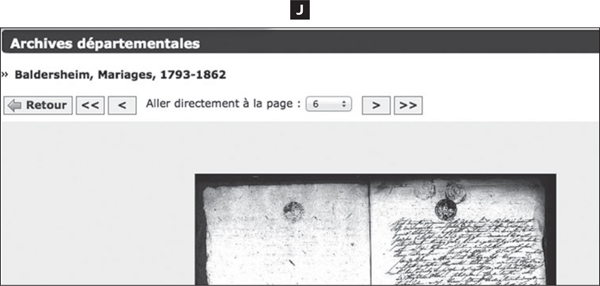
You can browse available civil registration books on the Haut-Rhin archives’ website.
This website <www.wittgensteiner.net> is run by Jochen Karl Mehldau, and he uses it to manage requests for information from his Wittgenstein Family File that he himself has composed over the course of the last thirty-three years. His database (image K.) is a derivative source that lists the primary source that the information was taken from. Mehldau used mainly Catholic and Evangelisch church books to compose the database but also consulted some books for information. Wittgenstein, the focus of the records, is in the southeastern part of the modern-day state of Nordrhein-Westfalen (North Rhine-Westphalia). The site has Catholic and Evangelisch church records in the area of Wittgenstein from as far back as the early 1500s in some villages and as recently as the late 1800s in some villages. Note this resource isn’t free; the site charges fifty cents euro for each person located in the database and one euro per person for detailed information (such as godparents or place of residence). Contact Mehldau at jkmehldau@arcor.de for more information.

While it focuses on a particular family’s genealogy, the Wittgenstein Family File includes transcribed marriage records that will be helpful for nonfamily members as well.
Other local historians and genealogists may have done for their areas what Jochen Karl Mehldau has done for Wittgenstein. Use the information in apter 11 to help you find village contacts to query.
This free website <griesegegend-online.de> is dedicated to the Griese area of Mecklenburg, which corresponds to the southwestern part of the modern-day German state of Mecklenburg-Vorpommern, roughly centered on Ludwigslust. Transcribed marriage registers are available from many villages in this area, and you have access to transcribed baptismal records if you happen to have ancestors from the village of Kirch Jesar. For the marriage records, click the Kopulationsregister, Trauregister links for the year range you’re researching (image L.). For the Kirch Jesar birth records, click Taufregister Kirch Jesar.
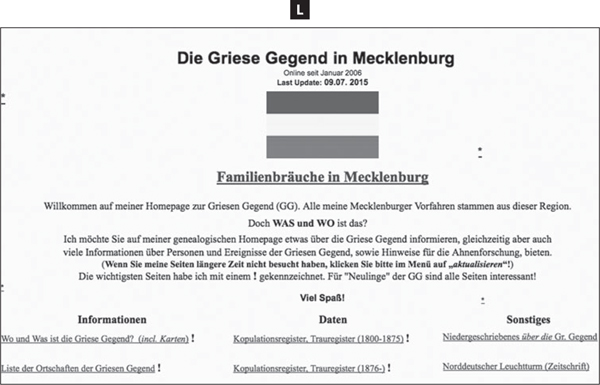
While only covering the Griese area of Mecklenburg, Die Griese Gegend contains useful marriage registers for villages in the region.
This free site <www.gschweng.de> is dedicated to the history of the Gschweng family, but it also has some transcribed church records from the surroundings of Arnswalde (now Choszczno, Poland) and Friedeberg (now Strzelce Krajenskie, Poland). Along the left frame of the page, scroll down to the Neumark section, then click Kirchenbücher. In the right frame, click the village you are interested in to see what records have been transcribed for that locale (image M.).
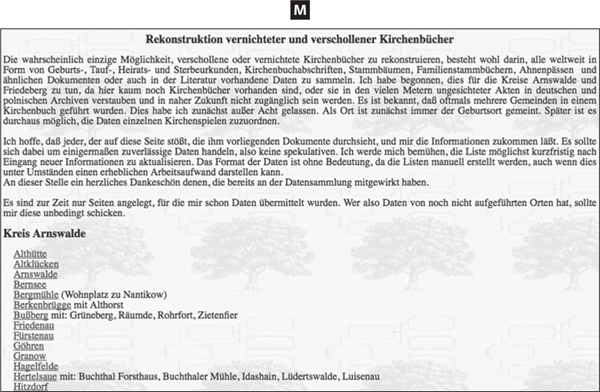
The home page for the Gschweng family has some transcribed church records from villages in the historic Arnswalde and Freideberg regions, now in Poland.